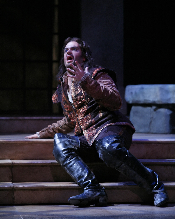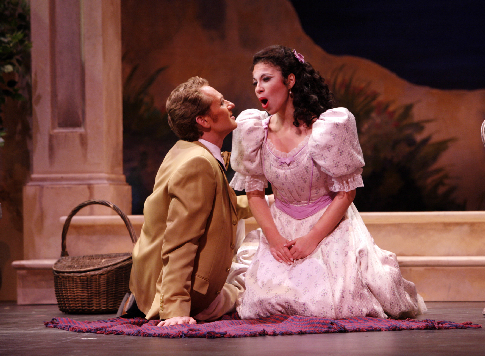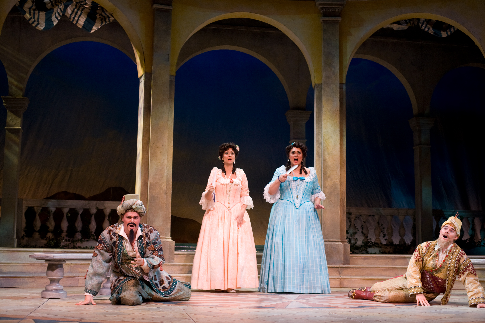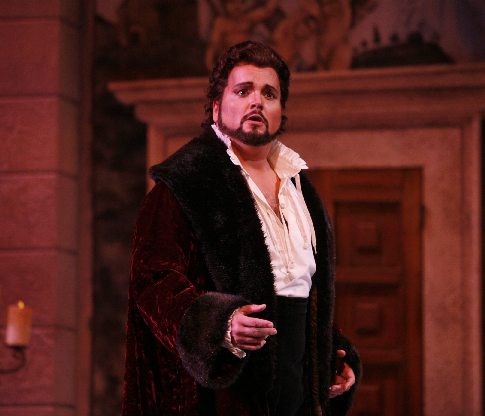
23 Apr 2008
Sarasota rises above the regional
Victor DeRenzi is a man of convictions — and of courage. Given his commitment to tradition, you might call DeRenzi, artistic director of Sarasota Opera since 1982, conservative.
English Touring Opera are delighted to announce a season of lyric monodramas to tour nationally from October to December. The season features music for solo singer and piano by Argento, Britten, Tippett and Shostakovich with a bold and inventive approach to making opera during social distancing.
This tenth of ten Live from London concerts was in fact a recorded live performance from California. It was no less enjoyable for that, and it was also uplifting to learn that this wasn’t in fact the ‘last’ LfL event that we will be able to enjoy, courtesy of VOCES8 and their fellow vocal ensembles (more below …).
Ever since Wigmore Hall announced their superb series of autumn concerts, all streamed live and available free of charge, I’d been looking forward to this song recital by Ian Bostridge and Imogen Cooper.
Although Stile Antico’s programme article for their Live from London recital introduced their selection from the many treasures of the English Renaissance in the context of the theological debates and upheavals of the Tudor and Elizabethan years, their performance was more evocative of private chamber music than of public liturgy.
Evidently, face masks don’t stifle appreciative “Bravo!”s. And, reducing audience numbers doesn’t lower the volume of such acclamations. For, the audience at Wigmore Hall gave soprano Elizabeth Llewellyn and pianist Simon Lepper a greatly deserved warm reception and hearty response following this lunchtime recital of late-Romantic song.
For this week’s Live from London vocal recital we moved from the home of VOCES8, St Anne and St Agnes in the City of London, to Kings Place, where The Sixteen - who have been associate artists at the venue for some time - presented a programme of music and words bound together by the theme of ‘reflection’.
'Such is your divine Disposation that both you excellently understand, and royally entertaine the Exercise of Musicke.’
‘And there was war in heaven: Michael and his angels fought against the dragon; and the dragon fought and his angels, And prevailed not; neither was their place found any more in heaven … that old serpent … Satan, which deceiveth the whole world: he was cast out into the earth, and his angels were cast out with him.’
There was never any doubt that the fifth of the twelve Met Stars Live in Concert broadcasts was going to be a palpably intense and vivid event, as well as a musically stunning and theatrically enervating experience.
‘Love’ was the theme for this Live from London performance by Apollo5. Given the complexity and diversity of that human emotion, and Apollo5’s reputation for versatility and diverse repertoire, ranging from Renaissance choral music to jazz, from contemporary classical works to popular song, it was no surprise that their programme spanned 500 years and several musical styles.
The Academy of St Martin in the Fields have titled their autumn series of eight concerts - which are taking place at 5pm and 7.30pm on two Saturdays each month at their home venue in Trafalgar Square, and being filmed for streaming the following Thursday - ‘re:connect’.
The London Symphony Orchestra opened their Autumn 2020 season with a homage to Oliver Knussen, who died at the age of 66 in July 2018. The programme traced a national musical lineage through the twentieth century, from Britten to Knussen, on to Mark-Anthony Turnage, and entwining the LSO and Rattle too.
With the Live from London digital vocal festival entering the second half of the series, the festival’s host, VOCES8, returned to their home at St Annes and St Agnes in the City of London to present a sequence of ‘Choral Dances’ - vocal music inspired by dance, embracing diverse genres from the Renaissance madrigal to swing jazz.
Just a few unison string wriggles from the opening of Mozart’s overture to Le nozze di Figaro are enough to make any opera-lover perch on the edge of their seat, in excited anticipation of the drama in music to come, so there could be no other curtain-raiser for this Gala Concert at the Royal Opera House, the latest instalment from ‘their House’ to ‘our houses’.
"Before the ending of the day, creator of all things, we pray that, with your accustomed mercy, you may watch over us."
The doors at The Metropolitan Opera will not open to live audiences until 2021 at the earliest, and the likelihood of normal operatic life resuming in cities around the world looks but a distant dream at present. But, while we may not be invited from our homes into the opera house for some time yet, with its free daily screenings of past productions and its pay-per-view Met Stars Live in Concert series, the Met continues to bring opera into our homes.
Music-making at this year’s Grange Festival Opera may have fallen silent in June and July, but the country house and extensive grounds of The Grange provided an ideal setting for a weekend of twelve specially conceived ‘promenade’ performances encompassing music and dance.
There’s a “slide of harmony” and “all the bones leave your body at that moment and you collapse to the floor, it’s so extraordinary.”
“Music for a while, shall all your cares beguile.”
The hum of bees rising from myriad scented blooms; gentle strains of birdsong; the cheerful chatter of picnickers beside a still lake; decorous thwacks of leather on willow; song and music floating through the warm evening air.

Victor DeRenzi is a man of convictions — and of courage. Given his commitment to tradition, you might call DeRenzi, artistic director of Sarasota Opera since 1982, conservative.
These, however, are concepts given new dimensions by the four operas on stage this spring in Sarasota’s newly remodeled 1200-seat theater.
DeRenzi is no friend of Regieoper, the approach to opera that gives the director full freedom to ignore the original time and place of a work — and the intentions of the composer. At Sarasota Opera, for example,you will never see Handel’s “Julius Caesar” set at the Cairo Hilton,where Peter Sellars once located it to great acclaim. That does not mean,however, that DeRenzi is a man stuck in an bygone age. His concern is for fidelity to opera and for authenticity and integrity in SO stagings.
Much research and study go into each production to make it reflect its time in history. Every effort is made to offer an honest presentation of a composer intentions. All this came to the fore in the season’s “I due Foscari,” which was part of two major SO projects. It continued the Verdi cycle designed to perform the composer’s entire oeuvre — operatic, vocal and instrumental — in Sarasota.
Launched in 1989 by DeRenzi, a Verdi scholar in his off hours, the cycle includes alternate of versions of scores when they exist. It will conclude in2013 to celebrate the 200th anniversary of the composer’s birth.“Foscari” is also part of DeRenzi’s “Masterworks Revival Series,” which brings to the SO stage long-neglected works that the director considers of artist merit. The series, begun in 1989, has included such rarities on the American stage as Catalani’s “La Wally,” “Königskinder” by Humperdinck and Rimsky-Korsakov’s “May Night.”
Given the quality of the SO “Foscari,” directed by Martha Collins, the neglect of the 1844 score is difficult to understand. The opera, the well-focused and touchingly sad story of a wronged father and son, is without the complexities that often make Verdi’s plot line hard to follow. With DeRenzi on the podium, the April 6 performance moved with edge-of-the-seat excitement through three hours of full-blooded choruses — several of them for men alone.
Italian baritone Marco Nistico brought dramatic intensity to octogenarian Doge Franceso Foscari, while Benjamin Warschawski sang his passionate song with an energetic voice that, however, lacked the support that a good teacher should have given the Swiss tenor. As devoted wife, mother and daughter-in-law Panamanian soprano Reyna Carguill bore the sufferings of Lucrezia Contarini with regal dignity. Jeffrey W. Dean’s sets were of classic simplicity, and costumes by Howard Tsvi Kaplan brought the richness of primary colors to the staging.
That one knows of Puccini’s “La Rondine” at all is due to the popularity of the aria “Il bel sogno di Doretta,” a favorite of singers from Kiri Te Kanawa to Renee Fleming. And a pity that is, for the entire work, performed as lovingly as it was at the SO April 5 matinée, is an experience of heightened sensuous beauty. Some devaluate the sumptuous score as operetta, for in the directness of its emotional appeal it follows in the footsteps of Vienna’s fin-de-sie`cle masters. And the reference to Vienna is indeed valid, for Puccini had been asked to write “a comic opera like‘Der Rosenkavalier,’ but more amusing and more organic.” Whether“ Rondine” amuses the individual can decide, but the work is organic in that is well organized and tightly written. Nothing in it is superfluous.
 Ryan MacPherson as Ruggero and Lina Tetruashvili as Magda (Photo by Richard Termine courtesy of Sarasota Opera)
Ryan MacPherson as Ruggero and Lina Tetruashvili as Magda (Photo by Richard Termine courtesy of Sarasota Opera)
Georgian soprano Lina Tetruashvili, who headed the cast as Magda, was perhaps the top star of the entire ’08 SO season. A young woman of gentle beauty, she was equally convincing as the successful courtesan and as a woman experiencing great love for the first time. As both she was painfully vulnerable, and her delivery of the first-act confessional self-confrontation competed favorably with recordings by established divas. Tenor Ryan MacPherson was a perfect blend of spoiled mama’s boy and unwritten page as a Ruggero who was a perfect partner for Tetrusashvili. As the second couple in the story Christina Bouras sang the maid Lisette with ironic detachment and a sense of good humor about the fools that mortals can be. But the true hero of the afternoon was David Neely, a young conductor whose career centers in Germany. Neely obviously believes in this score and in his surrender to its beauty made a fine case for its greatness.
The scenery and costumes that evoke the time and place of each SO production were particularly noteworthy in the second act of “Rondine.” A café of the Belle Époque was designed to perfection by Michael Schweikardt.An abundance of glass walls and ceilings, some decorated with sprays of flowers, made visible groups of round lights and a gray cityscape outside. References to the posters of the period by Alphonse Mucha and Toulouse-Lautrec provided a perfect ambiance for chance meetings and revelry.
Sometimes called “a poor man’s ‘Traviata’” because of parallels in plot, director Michael Unger proved that “La Rondine” is anything but;it is an opera to be taken seriously for its own merits. One hopes that the excellence of the SO staging will lead other companies to consider the work.
It is probably a good thing that Mozart’s “Cosí fan tutte” lists as a comic opera, for — considered in the cold light of day — this opera offers a picture of man — and woman — that in its brutal frankness is of a shocking cruelty that would otherwise ban it from the stage. (Indeed, one left the matinée performance on April 6 recalling the admonition from Georg Büchner’s drama “Woyzeck:” “Humans, you are sand, dust and filth —how dare you pretend to be more?”) Small wonder then that it took “Cosí” well over a century to find its way into the repertory. Fortunately, Mozart conceals his view on human frailty beneath the surface of music irresistible in its charm and élan, and Sarasota was fortunate in having as it conductor Pacien Mazzagatti, a youthful American who understands both dimensions of the work.
New Yorker Mazzagatti had cast and orchestra on such short leash that it was almost impossible for the audience to applaud at the end of arias. This practice should spread to operas everywhere, for it was astonishing to seethe continuity and dramatic structure that there is in Mozart when the music is not continuously interrupted by listeners overly eager to show their appreciation. Director Pat Diamond had an ideal quartet at his disposal:Marie Adele McArthur (Fiordiligi), Vanessa Cariddi (Dorabella), Sean Anderson (Gugglielmo) and Chad A. Johnson (Ferrando). Young, good looking and secure in their roles, the four easily kept pace with Mazzagatti’s animated approach to the score. Stephen Eisenhard was a worldly Alfonso without the Mephistophelean overlay often encountered elsewhere these days, but it was Alice Bernesche who really made things move as a bright and witty Despina. David P. Gordon’s airy sets permitted spoke almost fragrantly of the land where lemons blossom and allowed for quick changes by stage hands also in costumes by Howard Tsvi Kaplan.
 Sean Anderson as Guglielmo, Vanessa Cariddi as Dorabella, Marie-Adele McArthur as Fiordiligi, and Chad A. Johnson as Ferrando (Photo by Danielle Rappaport courtesy of Sarasota Opera)
Sean Anderson as Guglielmo, Vanessa Cariddi as Dorabella, Marie-Adele McArthur as Fiordiligi, and Chad A. Johnson as Ferrando (Photo by Danielle Rappaport courtesy of Sarasota Opera)
“Rigoletto” is something of a signature opera in Sarasota. In 1989 DeRenzi launched his Verdi Cycle with the 1851 work and he chose it to reopen the company’s renovated Mediterranean Revival theater this season. (The project cost $20 million.) It is thus surprising that it fell below the standard of excellence and excitement set by the other three works on SO stage this season. Michael Corvino kept the jester’s unsavory side in check to emerge as a truly tragic figure. However, Rafael Dávita sang — and played — the Duke with all the markings of a provincial tenor, and as Gilda Erica Strauss failed to catch fire. Impressive singing came from those in minor roles: Jeffrey Tucker (Sparafucile), studio artist Blythe Gaissert (Maddalena) and Jonathan Carle (Monterone). DeRenzi’s conducting was neither inspired nor inspiring. Stephanie Sundine directed; designer was David P. Gordan, and costumes by Howard Tsvi Kaplan. “Cosí” was a revival of the 2002 staging; the three other productions were new this season.
Although Saratoga packs its 33 performances — plus several programs staged by its apprentices — into a seven week March/April season, the company is an active presence on the Florida arts scene throughout the year.From August through April the SO musical staff works with three Youth Opera Choruses that enroll members beginning at age eight. They stage formal concerts in various venues in the city and appear also in hospitals, senior residences and nursing homes. The ensembles have participated in Italy’s International Choral Festival in Tuscany. As soon as the main season ends, work begins on the annual Youth Opera Production that stages works expressly written for children and young adults.
On stage in May this year is Canadian composer Dean Burry’s “The Hobbit,” a work based on J.R.R. Tolkien’s classic novel that was premiered to critical acclaim by Toronto’s Canadian Children’s Opera in 2004. Saratoga presents the American premiere of the work at performances slated for May 9 and 10. And SO has commissioned America’s senior music master Ned Rorem to compose a new work for 2009 based on Winsor Mcay’s comic strip “Little Nemo in Slumberland.” The libretto is being written by J.D. McClatchy. Members of the Youth Opera Choruses work with SO’s professional staff as supernumeraries and — when required — in children’s roles and choruses in mainstage productions.
 Rafael Dávila as the Duke of Mantua (Photo by Richard Termine courtesy of Sarasota Opera)
Rafael Dávila as the Duke of Mantua (Photo by Richard Termine courtesy of Sarasota Opera)
Sarasota, with a population of 300,000, is — like much of Florida — primarily a retirement community. It is relatively easy to find accommodations within easy walking distance of the opera, which has contributed greatly to the revitalization of the downtown area. The town is immaculately groomed, and good — and reasonably priced — restaurants abound. Public transportation, although limited largely to daylight hours, is well organized. It gets one to the famed Ringling Art Museum in only 15 minutes. The small airport is a fairy-tale realm compared to the chaos and confusion that prevails elsewhere today. A taxi to downtown is as little as $13.
An advantage of the SO main season is that on two weekends one can hear all four operas in only three days. On the other hand, it seems a shame to spend so little time in a town that offers a maximum of leisure at slow tempos.
Saratoga Opera opens its 50th anniversary season in November with “Barber of Seville.” On stage in spring 2008 are “Tosca,” “Elixir of Love,” “L’amico Fritz” and “Don Carlos.”
For information, visit www.sarasotaopera.org
Wes Blomster